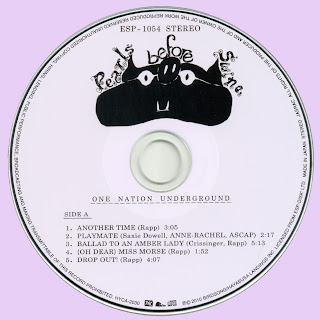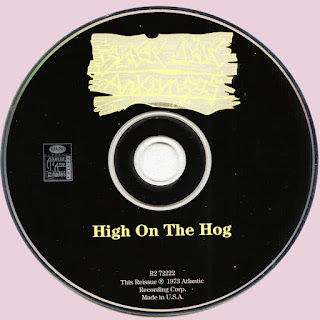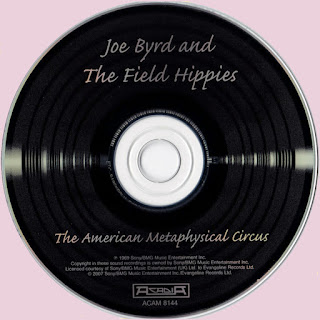
The sixties are remembered as a very fertile time for music, when bands were actually encouraged to take risks, be different, try something new and write their own material. With so many talented acts around, it's easy to see how some of the less-commercial bands might be forgotten. Sometimes the most interesting music is the kind you have to seek out and dig for, like a lost treasure- SRC are a perfect example of this. With musical barriers and restrictions being torn down then, it allowed bands across the country to do something original. Detroit specifically, from the mid sixties to the early seventies, had a budding scene where bands were producing harsher sounds and pushed the musical limits. This was the atmosphere in which the heavy psychedelic rock of SRC would flourish. It's important to make clear that SRC shouldn't be confused with the Nuggets bands, most of whom could only produce one or two songs of merit. SRC wrote a lot of strong material, pushed boundaries and still sounds fresh to new ears today. This is their story.
The band started when the Fugitives consisting of Gary and Glenn Quackenbush (guitar and organ) and drummer E.G. Clawson took the lead singer Scott Richardson from another local band, the Chosen Few (their past notoriety being opening up the Grande ballroom in Detroit with the MC5). Then after adding Robin Dale on bass and Steve Lyman on rhythm guitar, they formed the Scott Richard Case (later shortened to SRC so as not to have emphasis on any individuals in the group) and released their 1967 debut single (A-Square Records), a cover of Skip James “I'm So Glad." No doubt SRC first heard the song off of Cream's debut record, but they don't do a by-the-numbers retread of it. Their version has more energy and feeling to it. The guitars get a raw sound, the lyrics are sung with conviction and it has a nice fuzzed-out solo that only hints at Quackenbush's talent. The song became a hit locally that summer and with help of their future producer John Rhys, they met the V.P. of Capitol records and signed a contract with them.
SRC had their own distinct sound and unique vision- heavy psychedelic rock mixed with hard rock overtones with Quackenbush's lead guitar style really contributing to their overall sonics. Quackenbush's technique was incredible, especially the way he used feedback and incorporated it into searing solos that are so expressive and can range from melodic to chaotic in a matter of seconds in the same song. This made the band stand out, although the other band members shouldn't be underestimated since it's when they all got together that the songs took form. Their music is the kind you get lost in, you forget yourself and your surroundings just melt away. Their sound reflected influences like Cream, The Pretty Things, The Who and The Yardbirds and other British bands. They mixed that influence with the sound of peers from the local music scene (the Stooges,MC5 and the Amboy Dukes) to come up with something very unique and creative.
SRC's self-titled debut record (1968) is a classic of first rate psychedelic music and should be put alongside other classic from that era. The album is filled with great melodies and harmonies, outbreaks of raw noise and incredible ripping guitar solos that make you stretch your head back in amazement. The guitar sounds like it has a personality of its own throughout the record. The lead off track, "Black Sheep," is their best-known song and an anthem for outcasts. The song starts with a melodic organ carrying the tune along, punctured by bursts of huge sustained feedback guitar that crackle through the speakers, giving it a heavy stomp tempo to it. In the song, Richardson sings about how few black sheep they are and celebrates their fearlessness of the Unknown and their mission to do something unconventional. "Black sheep, outcast, misfit, Ishmael" the chorus goes, then seemingly out of nowhere comes a heavy intense sustained guitar lead that bends and wails. “Daystar" ups the intensity in a driving melody with responding feedback, interplaying the vocals with Quackenbush, who stretches out some fuzzy electric notes only to explode into a shredding noisy solo. “Exile" tells a spacey story set to music and ends with Quackenbush's wild guitar howling like some kind of demented animal. “Paragon Council" gets building with its melody going along with the commanding lead guitar that changes into a searing, powerful catchy riff that compliments each other and then goes completely mental. “Refugeve," a very innovative track, opens with the feeling of exhaling a deep breath. It has numerous parts that don't follow a standard song format, staring with high, atonal notes, and progressing until it evolves into a fuzzed out power chord Mudhoney-like groove. They even do a psychedelic cover version of the classical chestnut "Morning Mood" (from Grieg's "Peer Gynt") on the album. The music on this record, filled with distortion and loud manic solos, challenged mainstream listeners. Like many fresh, innovative ideas, most people couldn't grasp it- although it sold well locally, it had little impact outside of the Midwest.
Before the start of the second record, they switched bass players, with Robin Dale being replaced by Al Wilmot, and dropped their second guitarist Steve Lyman. Whether the line up change or pressure from Capitol to write something more commercial due to low sales effected them is uncertain, but their sound became different. Milestones (1969), SRC's second record, finds them mixed between expanding on their earlier heavy sound and trying out new styles that they might not be suited for, making the record inconsistent. “No Secret Destination" kicks the record off with a flurry of urgency coming from the organs and a siren-like guitar lead that give way to a rising melody that eventually goes into a scorching, cacophonic noisy solo that attacks your ears. “Eye of The Storm", another highlight, starts slow, dissonant and menacingly, erupting into a moving rhythm and distorted guitar lead.
The chorus has a great simple melody while Richardson sings “somewhere it's quiet, somewhere its warm, it's peaceful and calm in the eyes of the storm" as if he'd found tranquility within a hectic storm. Unfortunately, the album is marred with mediocre and awful attempts at easy listening pop ("Show Me," "I Remember Your Face," "Our Little Secret"). "Checkmate" balances out the bad with a throbbing, thumping bassline throughout the song, with crunchy guitar and an explorative organ solo. “Up All Night" shows them letting loose with tons of energy. There's rocking melody, bouncy bassline and Quackenbush injecting real aggressive attitude into the guitar making it growl and spit out screaming feedback notes.
It's interesting to note that the band chose to put the easy listening songs at the beginning of the record while “Up All Night" one of the best tracks is the second to last on the album. “Turn Into Love" shows the band trying to incorporate both styles in the same song as it has a fat R&B vibe to it with back up soul singers and Quackenbush giving a tearing fury guitar storm. The album ends on a good ambitious note with the lengthy and atmospheric “Angel Song" that tells a story of an angel who wishes to be able to dream while an empathetic and fuzzy lead are played over it, showing that they were still trying to stretch their neck out and try something different .
When Milestones was released in March '69 with no promotion, it still sold much more than their debut. EMI even picked it up and re-released it in Europe because of it getting airplay there. With Milestones getting them recognized, SRC were able to do a West coast tour but there was a large contrast between their sound and the hippie music there. It ended up making SRC re-evaluate their sound- ultimately, they kicked out Gary Quackenbush out of the band. Richardson stated “It got to the point where we couldn't completely carry on with Gary. It was like another plateau that we were building up to. We'd been to San Francisco and gotten it into our heads what our next level of working should be. We just had to make another step and he couldn't make it with us."
As Quackenbush no longer fit in with the band's sound, the less talented Ray Goodman took his place and SRC started recording their third album Traveler's Tale (1970), which lacks the bite and energy that gave SRC its appeal. The songs were longer with more prog rock passages and came off sounding generic and faceless with Goodman trying to match Quackenbush's abilities. One track, “The Offering," has the band playing with a large orchestra and comes out as a failure. Although a few shorter songs ("By Way of You," "Midnight Fever") redeem it from being complete garbage, you can't help but imagine how much better they'd sound if Gary could have contributed something instead of someone else doing an imitation of him. There's a reason why when they made an SRC compilation later on, this album had the fewest tracks taken from it.
When Traveler's Tale came out, it didn't sell well. Goodman left and SRC asked Quackenbush to return to the band. SRC recorded a few new songs with new bass player Richard Haddad, but were dropped from Capitol in 1971 due to lack of sales. The band decided to have one more go at it by changing their name to Blue Scepter and getting a new record label. They released a single “Out in The Night" (a Pretty Things cover) featuring horns, backed with an original called “Gypsy Eyes" that reinstated Quackenbush's intense guitar playing. They recorded enough for an album but it was shelved when the single flopped.
Over the next few decades, SRC's albums went out of print until 1987, when a skimpy best-of compilation was put together by the Bam Caruso label (The Revenge of the Quackenbush Brothers). One Way Records went a step further and did a small scale re-issue of their three studio albums and compiled an album of leftovers called Lost Masters. Its first half is made up of Blue Scepter songs, sounding like a better follow-up to Milestones with a more stripped down sound but plenty of acid rock solos from Quackenbush. The second half comes from their last days at Capitol and has them doing covers and playing different genres like psychedelia, blues and R&B but this time, they match up strongly with the solos, still leaving a strong effect on the listener. A better compilation was done in 2000 by the RPM label (Black Sheep)- there were more tracks and it was made more widely available than any of their other releases, introducing a whole new generation to their music.
SRC's music has crept up as an influence to other bands over the years. Bands like Hawkind, Dinosaur Jr, Mudhoney and other heavy rock bands with insane psychedelic leads share traits with SRC's sound. Even if some of these bands never heard SRC, there's still a correlation. When SRC's music came out, they was ahead of its time and suffered for it. But by doing it their way, they broke ground. The use of jaw-dropping distortion and noise became more acceptable over the years for many musicians after numerous bands like SRC broke the mold. It's a crime their records aren't in print again, but thanks to the Internet, more people can hear them now than ever (myself included). Hopefully, this article will turn more people onto this wonderful, amazing band.
by
Tim Shannon
Tracks:
1. Black Sheep
2. Daystar
3. Exile
4. Marionette
5. Onesimpletask
6. Paragon Council
7. Refugeve
8. Interval
9. Morning Mood (Bonus track)
10.Black Sheep (Bonus track)
SRC
*Steve Lyman - Second Guitar and Voice
*Glenn Quackenbush - Hammond Organ
*Scott Richardson - Lead Voice
*E.G. Clawson - Drums
*Robin Dale - Bass and Voice
*Gary Quackenbush - Lead Guitar
Free Text
Text Host







































